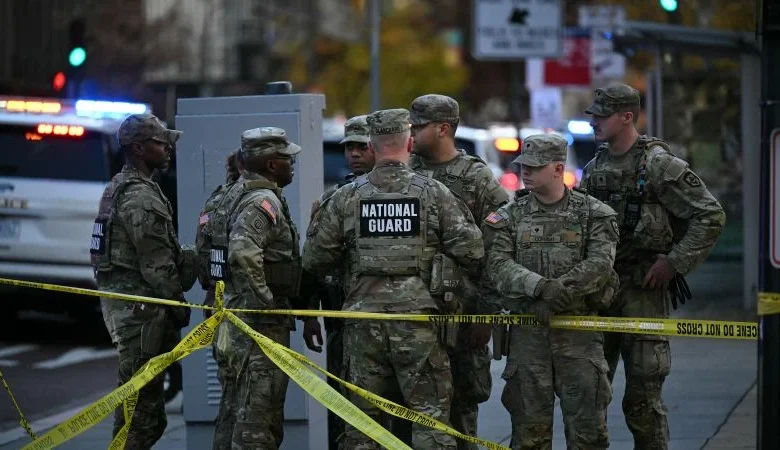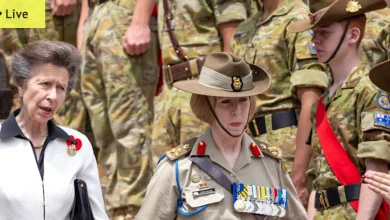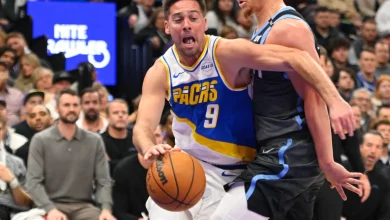Trump vows immigration crackdown after shootings of National Guard members in DC

It took only a few hours for President Donald Trump to turn what he called “an act of evil, and an act of terror” into a full-blown argument for an even more intense crackdown on immigration.
His vow came as authorities held a man Trump described as an Afghan national over the shooting of two West Virginia National Guard reservists in Washington, DC. They were in the capital as part of Trump’s controversial deployment of troops to bolster law enforcement.
“America will never bend and never yield in the face of terror, and at the same time, we will not be deterred from the mission these service members were so nobly fulfilling,” Trump said.
The president, speaking on video from his Mar-a-Lago resort in Florida, pivoted quickly from paying tribute to the victims of the tragedy to blaming the Biden administration for bringing the alleged shooter to the United States after the withdrawal of American troops in 2021. He claimed the incident “underscores the single greatest national security threat facing our nation.”
But he also used the moment to drive home his campaign against other migrants in politically charged remarks that went far beyond Afghanistan — at a moment when his administration is moving to reinterview some refugees admitted under President Joe Biden and revoking temporary protected status for those from several dangerous world hot spots.
Trump lashed out at Somali immigrants in Minnesota, despite there being no apparent connection with the DC shooting. He claimed they were “ripping off our country and ripping apart that once-great state.” Trump described Somalia as a country that has “no laws, no water, no military, no nothing.”
The full details of the incident in Washington are not yet known. But Trump’s comments were characteristic of a president who rarely waits for full clarity before engaging politically.
But there will certainly be urgent questions about the vetting of Afghan immigrants — many of whom came to the US during the Biden administration after helping American forces during the country’s longest war. While the exact circumstances of Wednesday’s incident are not fully known, the FBI has long warned about the danger of self-radicalized individuals from immigrant communities becoming inspired by groups such as ISIS or online propaganda and carrying out attacks on the US homeland.
Scrutiny may also fall on any follow-up immigration proceedings for the suspect that stretched into Trump’s second term. Then there’s the question of whether there were intelligence failures by Trump’s team ahead of Wednesday’s attack, at a time when government agencies are accused by critics of diverting resources from national security to immigration enforcement.
Politically, Trump seemed to be keen to define the debate that is sure to unfold over the shootings.
He vowed to “reexamine every single alien” who came to the US from Afghanistan, in remarks that will likely create fear among law-abiding immigrants — many of whom helped the US military and diplomats at considerable risk to themselves and their families during America’s longest war.
The president’s senior White House adviser Stephen Miller said on Fox News after the attack that Trump had made a “historic announcement, a brave announcement.”
“What you heard tonight from President Trump, the breaking news here tonight, is saying that his government is going to accelerate efforts to review every person added this country over the last four years,” Miller said.
“Now obviously, if you are illegal you are out automatically,” Miller continued. “But everybody else who was brought here, refugee, asylum status, whatever status … if you’re not someone who loves this country, if you’re not any benefit to this country, then we’re going to send you out of this country.”
Trump’s extremely political remarks may also have been designed to shut down any suggestions that the National Guard soldiers patrolling Washington in their fatigues have been left vulnerable by an ill-defined mission.
A political storm has raged around the National Guard since Trump ordered it into some US cities. Now, debate will sharpen over the guard’s role and the administration’s attempts to militarize law enforcement in what officials described as a “targeted shooting” on the eve of Thanksgiving.
The shootings in Washington, DC, were the latest shocking outburst of public violence in a wrenching year that saw the assassination of conservative activist Charlie Kirk and killing of a state lawmaker and her husband in Minnesota.
Wednesday’s tragedy took on extra poignancy as Americans gathered with their families ahead of the national holiday, and cut deep for the people of West Virginia, which is among several states to send volunteer reservists to DC.
For National Guard troops on the streets of the capital Wednesday night, the shootings raised immediate and traumatic questions over their safety and protection, as their comrades lay in critical condition in the hospital. National Guard troops sent to Washington have been notable for their good humor and professionalism. But suddenly the possible danger that comes with their mission has come into sharp focus.
More broadly, and once the motive of the assailant has been established, there will be scrutiny about the unusual nature of the mission that the troops are being asked to undertake, in peacetime, on domestic soil. In their military fatigues, National Guard troops are highly visible — as seems to be Trump’s intent for deterrence purposes — but that can also leave them exposed.
The Department of Homeland Security has identified the suspect as Rahmanullah Lakanwal. Officials briefed on the investigation said that they believe the shooter’s initial identification matches a man from Washington state who appears to have immigrated to the US from Afghanistan in August 2021. That theory will raise counter-terrorism concerns over whether the alleged shooter had a motivation to target US soldiers directly and whether other attacks are possible. US forces left Afghanistan for the last time in a chaotic withdrawal in August 2021.
The administration responded swiftly to the horror by doubling down on the deployment. Trump asked Defense Secretary Pete Hegseth to mobilize 500 additional National Guard service members to the capital. The administration had also filed an emergency court order seeking to keep guard troops in the city after a federal judge last week ordered their removal, pending appeal.
The National Guard’s initial deployment to Washington was hugely controversial and is part of a wider strategy that has seen reservists sent to other cities, including Los Angeles. Trump, who cultivates a strongman image, has long appeared keen to deploy troops on domestic soil, despite laws limiting their use in law enforcement missions. He called the guard to Washington in August while placing the Metropolitan Police Department under federal control and mobilizing officers from other agencies, arguing the city was a “filthy and crime ridden embarrassment” despite official data showing that crime was falling.
But critics warned that deploying troops was unnecessary and carried authoritarian overtones. Washington, DC, officials sued the administration, arguing that it had violated the city’s limited home rule and the authority of Congress, while flouting laws that prohibit the use of the military in domestic law enforcement in all but the most extreme circumstances. “The deployment also risks inflaming tensions and fueling distrust toward local law enforcement,” the lawsuit said.
That debate was already being revisited following Wednesday’s shooting, with a White House official forcefully rebutting criticism over the necessity of the guard’s presence in DC as an attempt to “politicize this tragedy.”
Police and the FBI were searching for a motive for the attack. City Mayor Muriel Bowser said that the guards were victims of a “targeted shooting.” With that in mind, the investigation will be important to establishing whether this was a politicized attack or whether the guard members were a target of opportunity — factors that are likely to shape how the politics of the incident’s aftermath develop.
Neither possibility will lessen the heinous nature of the shooting or detract from the tragedy of two volunteer reservists being shot while serving their country.
Trump has argued that his Washington, DC, crackdown is a huge success, and that people now feel safe in the capital. It’s unclear how the Thanksgiving shooting, which sent scores of people running from the scene, will influence perceptions of his strategy.
Critics of Trump’s approach have long worried that, far from making DC safer, the presence of uniformed troops on the streets could cause more tensions and that the soldiers could themselves be vulnerable. After the initial shock of seeing khaki-clad troops on the streets and vehicles in military livery, many Washingtonians have come to see Guard members as a largely benign presence. They are often seen milling outside Metro stations and even picking up litter in “beautification” projects. They have typically not been in combat posture, even though some have been armed.
But federal District Judge Jia Cobb wrote last week, in an order ruling that the Guard was illegally deployed in Washington, that there was a “substantial risk” that their presence “is going to lead to a dangerous or deadly encounter that could be catastrophic for public safety.”
Cobb, however, delayed her order 21 days to allow the Trump administration to file an appeal.
Now that troops have been the victims of an attack, Democrats are sure to question Trump’s decision-making.
California Rep. Robert Garcia told CNN’s Jim Sciutto that the attack was “horrific” and said he was thinking about “the entire Guard family.” He added that he wasn’t sure Trump’s ask for 500 additional troops was “the right call” and that decisions about the security situations should be left to local officials.
Democratic Rep. James Walkinshaw of Virginia told CNN’s Erica Hill the shootings were “shocking and horrific.” He noted that many people in the DC region admired the professionalism of the guard and have had positive interactions with them.
“Most of us in the Democratic side in Congress don’t think we should have National Guard men and women in our cities. But if that is going to happen, and when that is going to happen, I think it is incumbent on the administration to lay out a clear plan to ensure their protection,” said Walkinshaw, who just joined the House Homeland Security Committee.
Since officials are calling the shooting “targeted,” there will be questions over whether Guard troops have the necessary force protection measures and training to deal with risks they face on the streets. “You’ve put National Guardsman in a bad position, now you have got them serving as law enforcement … that’s not what they were trained to do,” former Washington, DC, Police Chief Charles Ramsey told CNN.
“You have got to really stop and think about what is it that are you trying to accomplish,” Ramsey said. “What is the mission?”
Nebraska Republican Rep. Don Bacon told CNN that in such an escalated political climate, everyone should react temperately to the horrific incident in Washington. “It is very incumbent on all of us, Democrats and Republicans, in the news, that we treat each other decently, we can disagree without being over the top, angry, throwing gas, lighting things on fire right now — our society, this hyper-partisanship that we have.”
Most leading politicians were taking Bacon’s advice, issuing statements calling for prayers for the injured service members.
But a tragedy like this is sure to have political implications.
This story has been updated with additional reporting.





